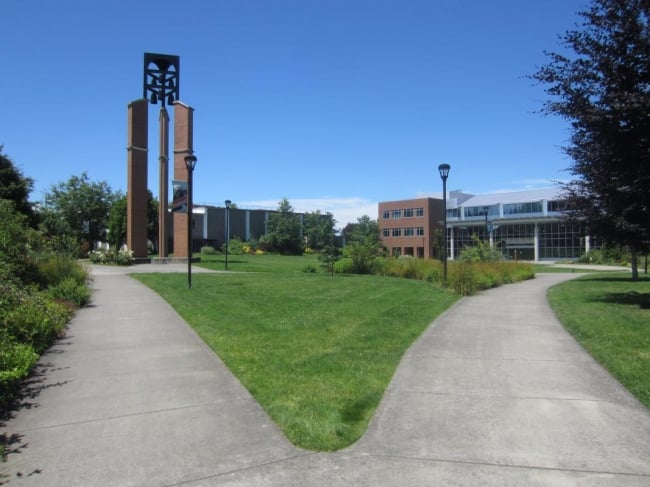You have /5 articles left.
Sign up for a free account or log in.

Concordia University in Portland, Ore., will close at the end of the spring 2020 semester.
Wikimedia Commons/Another Believer [CC BY-SA (https://creativecommons.org/licenses/by-sa/4.0)]
Concordia University in Portland, Ore., will close at the end of the spring 2020 semester, yet another in a string of private nonprofit colleges in the Portland area to close.
The private, nonprofit Lutheran institution's Board of Regents voted last Friday to cease operations at the 115-year-old institution, according to a Monday announcement.
Students who have not completed degree requirements will get "extensive information outlining pathways" at partnering institutions, said a section of the college's website devoted to information on the closure. Students' credits "may be considered for transfer" to another regionally accredited university, but accepting transfer credits is "always at the discretion of the receiving institution," the website said. Concordia is regionally accredited by the Northwest Commission on Colleges and Universities. The university is also working to create transition plans for faculty and staff in each department. It will work with the office of Oregon's attorney general as it closes to determine a plan for its assets.
A spokesperson for the university said the announcement was "certainly a surprise to many."
"The Board’s decision came after years of mounting financial challenges, and a challenging and changing educational landscape," the university said in a statement to Inside Higher Ed.
A statement from the Lutheran Church-Missouri Synod cited the "difficult environment confronting small private universities, not least religiously affiliated ones," as a reason for the closure.
"Colleges and universities nationwide continue to face challenges, even those whose contributions to their communities and the world are laudable," it said.
The university's strategic plan, called Vision 2024, stressed core themes of being Lutheran, rigor and creating servant leaders. It planned to "expand its physical campuses," "develop, expand and diversify strategic partnerships," and "ensure good stewardship of its resources."
Concordia follows in the footsteps of Marylhurst University and the Oregon College of Art and Craft, both small institutions in the Portland area that shut down within the last few years. Small religious colleges across the nation have been closing and consolidating at a steady clip as demographics change and students seeking affordability look elsewhere.
While enrollment over all has been up at Concordia since 2010, it peaked in 2014, according to federal data. And that growth was largely due to graduate students. Total undergraduate enrollment increased from 1,244 students in fall 2010 to 1,501 students in 2018. Graduate enrollment jumped from 870 in 2010 to 6,178 in 2014 before dropping back down to 3,841 in 2018. The current sticker price of tuition and fees for full-time undergraduates is about $31,000, up nearly 3 percent from last year.
Revenue was down. Concordia's 2018 annual report shows the university had about $113.2 million in revenue in 2018, down from $116.5 million in 2017. More than 80 percent of its revenue was coming from tuition and fees. Expenditures outpaced revenue in 2017 by about $8 million, then expenses came in just below revenue in 2018 due largely to nearly $12 million in expense cuts.
"The university’s current and projected enrollment and finances make it impossible to continue its educational mission," a university spokesperson said.
The six-year graduation rate for a bachelor's degree at Concordia was 47 percent for the cohort that started in fall 2012. Nationwide, the average six-year graduation was 60 percent for those who started in 2011.
Juliana Smith, an associate professor at the university and chair of the Executive Faculty Committee, Concordia's version of a Faculty Senate, deferred a request for comment to the university's spokeswoman.
The university employs 63 full-time and 172 part-time faculty members, according to federal data.
The university also ran into trouble with the federal government in 2015. The U.S. Department of Education alleged the university illegally outsourced some of its online programs to a private contractor, HotChalk Inc., according to The Oregonian. Online education led to Concordia becoming one of the nation's largest providers of education master's degrees. The university paid out a $1 million agreement to settle the claim while denying wrongdoing.
Monday's news comes after the university held its ninth annual Victor Atiyeh Leadership in Education Awards event last week, according to The Oregonian. It raised $355,000 for student scholarships for the 3toPhD program, a collaboration between the university, local public schools and health institutions to provide support for children from "the first three trimesters of life" to earning a Ph.D. -- from prenatal care services to early childhood education to college academics.
"At that point the Board had not voted to close the college, therefore it was business as usual," the university said in a statement when asked why the fundraiser was held. "The donations made through this event go to support scholarships for students in the 2019-2020 academic year and the 3toPhD program."




